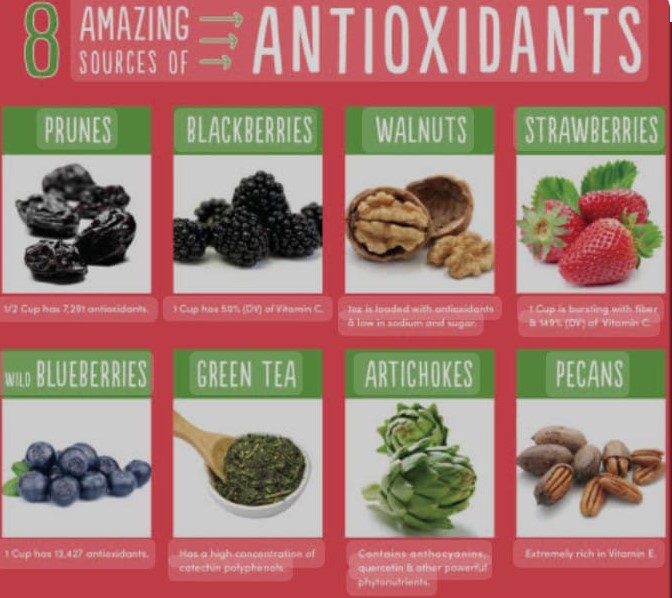
2024-07-24T05:35:37
Antioxidants are essential compounds that play a crucial role in maintaining health and preventing diseases. They combat oxidative stress, a process that can damage cells and contribute to aging and various diseases. This comprehensive guide will explore the importance of antioxidants, their sources, how they work, and how to incorporate them into your diet. Understanding Antioxidants What are Antioxidants? Antioxidants are molecules that neutralize free radicals, unstable molecules that can damage cells. Free radicals are produced naturally in the body as a byproduct of metabolism, but they can also be introduced through external sources like pollution, radiation, and unhealthy foods. How Do Antioxidants Work? Antioxidants work by donating an electron to free radicals, which stabilizes them and prevents them from causing cellular damage. This process helps to protect the body from oxidative stress and inflammation. Types of Antioxidants 1. Vitamins: Vitamin C: Also known as ascorbic acid, vitamin C is a powerful antioxidant found in fruits like oranges, strawberries, and kiwi, as well as vegetables like bell peppers and spinach. Vitamin E: This fat-soluble antioxidant is found in nuts, seeds, and green leafy vegetables. It protects cell membranes from oxidative damage. 2. Minerals: Selenium: This trace mineral, found in foods like Brazil nuts, seafood, and whole grains, helps to activate antioxidant enzymes in the body. Zinc: Found in meat, shellfish, legumes, and seeds, zinc supports immune function and has antioxidant properties. 3. Polyphenols: Flavonoids: These are found in fruits, vegetables, tea, and wine. They help to reduce inflammation and lower the risk of chronic diseases. Phenolic Acids: Found in coffee, fruits, and vegetables, they have anti-inflammatory and antioxidant effects. 4. Carotenoids: Beta-Carotene: Found in carrots, sweet potatoes, and spinach, it is converted to vitamin A in the body and supports eye health. Lycopene: Found in tomatoes and watermelon, lycopene has been linked to a reduced risk of certain cancers. The Benefits of Antioxidants 1. Reducing Oxidative Stress: Oxidative stress occurs when there is an imbalance between free radicals and antioxidants in the body. This can lead to cellular damage and contribute to aging and diseases like cancer, heart disease, and neurodegenerative disorders. Antioxidants help to neutralize free radicals, reducing oxidative stress and its harmful effects. 2. Supporting Immune Function: Antioxidants play a vital role in maintaining a healthy immune system. Vitamins C and E, in particular, enhance immune response by protecting immune cells from oxidative damage and supporting their function. 3. Preventing Chronic Diseases: Heart Disease: Antioxidants like vitamin E and flavonoids help to prevent the oxidation of LDL cholesterol, which can reduce the risk of atherosclerosis and heart disease. Cancer: Antioxidants such as selenium and carotenoids help to protect DNA from oxidative damage, reducing the risk of mutations that can lead to cancer. Neurodegenerative Diseases: Antioxidants like vitamin E and polyphenols help to protect brain cells from oxidative stress, potentially reducing the risk of diseases like Alzheimer's and Parkinson's. 4. Promoting Skin Health: Antioxidants like vitamin C and beta-carotene help to protect the skin from damage caused by UV radiation and pollution. They also support collagen production, promoting skin elasticity and reducing signs of aging. 5. Enhancing Eye Health: Carotenoids such as beta-carotene, lutein, and zeaxanthin protect the eyes from oxidative damage and reduce the risk of age-related macular degeneration and cataracts. Sources of Antioxidants Fruits and Vegetables: Berries: Blueberries, strawberries, raspberries, and blackberries are rich in vitamins C and E, flavonoids, and phenolic acids. Citrus Fruits: Oranges, lemons, and grapefruits are excellent sources of vitamin C. Leafy Greens: Spinach, kale, and Swiss chard provide vitamins A, C, and E, as well as carotenoids. Tomatoes: Rich in lycopene, vitamin C, and other antioxidants. Nuts and Seeds: Almonds and Sunflower Seeds: High in vitamin E. Chia Seeds and Flaxseeds: Provide omega-3 fatty acids and other antioxidants. Beverages: Green Tea: Contains catechins, a type of flavonoid with potent antioxidant properties. Coffee: Rich in phenolic acids. Red Wine: Contains resveratrol, a powerful polyphenol. Other Sources: Dark Chocolate: Contains flavonoids and other antioxidants. Herbs and Spices: Turmeric, cinnamon, and oregano are high in antioxidants #besthospitalinnagpur #besthospitalnearme #besthospitalindighori #besthospitalonumredroad #besthospitalinsakkardara #bestsurgeryhospitalonumredroad #bestorthopaediciannearme #bestfracturehospitalonumredroad #dialysisfacilitynearme #xraycentrenearme #maternityhospitalnearme #besthospitalonumredroad # best ortho hospital in nagpur # best joint replacement hospital near me

